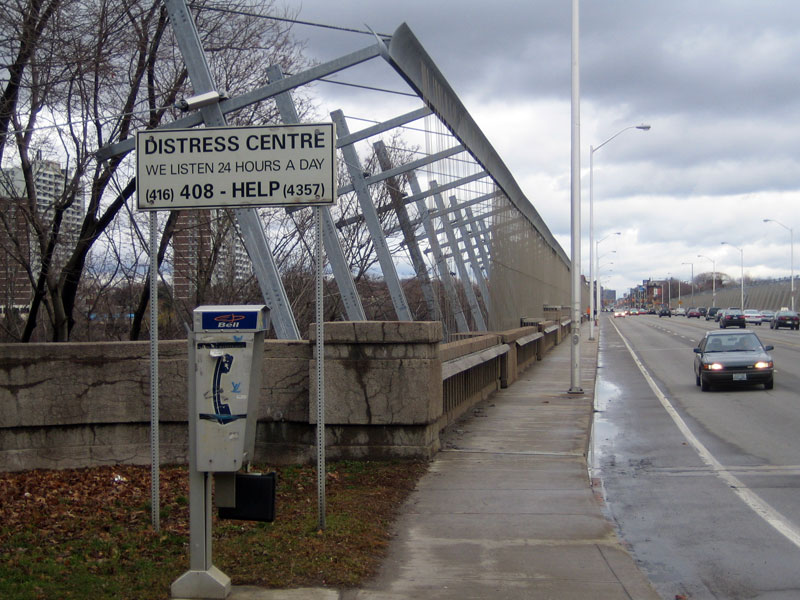In 2005, I decided to volunteer at a distress center. The reason I decided to volunteer as a crisis management support worker was to understand why someone would consider taking his life. Specifically, I wanted to why my aunt would end her life at the age of 24.
Once a week for eight weeks, I attended workshops in crisis management training. I learned that suicide was not a cry for help but a cry for life. During one session, an expert on suicide informed us that each person that survived jumping off the Golden gate bridge regretted their decision. I also learned that the majority of people don’t end their life during the Christmas holidays or winter. They’re too depressed to commit to dying. Depressed people usually commit suicide when the weather improves because a change of season gives that lifeless person the energy to go through with it. Besides learning the tell tale signs of a suicidal person, I learned skills that have completely changed the way I interact with people.

For example, if you want to open a dialogue with a resistant person, you should pose open ended questions. You can calm an excited individual by speaking slowly. You should also never give anyone unsolicited advice. Never judge someone. Validate people’s feelings by empathizing with them. Surely, you can understand how it feels to be heart broken, depressed, lonely or closeted. The only thing that we can tell callers was to walk when feeling anxious or depressed. Studies have shown that walking stimulates pleasure. I learned a lot during training.
I was really nervous on my 1st day. I feared that I was going to get THE CALL. I actually never got the call although I was well more than equipped to handle it. I still recall my training: “Why do you want to kill yourself?” “What is your plan?” “How serious are you?” My script Highway 401 touches upon my experiences at the distress center.
Calls at the distress center ranged from lonely seniors venting about the summer heat. Women wanting to know where they can meet decent men. Men complaining about friends. Women gossiping about their coworkers. I realized that crazy people don’t call distress centers, normal people do. Lots of lonely people want to talk. The difference between a lonely person and a lonely distressed caller is that the distressed caller is more likely to take his life. Crisis management councilors save lives. Their were never any negative side effects attributed to calling a distress center councilor. You can’t say the same thing about treating depression with psychotropic drugs
Psychiatric Treatments May Cause Increased Suicide. “The FDA — despite protests by the psychiatric establishment — has issued “ black box warnings” about the potential for increased suicidality for patients under the age of 25 who use antidepressants. In 2014, AlterNet reported about a University of Copenhagen study comparing Danish individuals who committed suicide to matched controls between the years 1996 and 2009. The researchers found that taking psychiatric medications in a prior year was linked to a 5.8 times increase in suicide; contact with a psychiatric outpatient clinic was associated with an 8.2 times increase; visiting a psychiatric emergency room was linked to a 27.9 times increase; and admission to a psychiatric hospital was linked to a 44.3 times increase in suicide.While correlation by itself does not necessarily mean causation, an accompanying editorial in the same journal where the article was published pointed out that associations with the features detailed in this particular study indicate a good possibility of a causal relationship. Among the reasons why psychiatric treatment could well cause increased suicide, besides the adverse effects of medication, is the stigma and trauma of treatment, as the editorial authors state: “It is therefore entirely plausible that the stigma and trauma inherent in (particularly involuntary) psychiatric treatment might, in already vulnerable individuals, contribute to some suicides.”
Last week, I brought up the RHPA Act. The Ontario government (and governments all over the world) is trying to eliminate access to holistic medicine by attempting to legislate the Registered Health Profession Act (RHPA). If you prefer traditional, holistic, energy and/or spiritual care treatments not influenced by the medical/drug approach, your choice in assessment and treatments of your issues will be restricted to someone who is a registered psychotherapist, psychologist or psychiatrist.
This legislation is designed to create a monopoly for the pharmaceutical industry. If you practice any form of traditional, non-medical healing therapy and/or treatments or counseling, including spiritual and addictions counseling, in the Province of Ontario, your rights to do so will be severely restricted after March of this year.
Stories of Distress Centers shutting down are quite common in North America. Governments don’t divert funds to keep distress centers open. Distress Centers rely heavily on donations to keep their phone lines open. Distress Centers don’t fall under the umbrella of the RHPA.They don’t make money and that’s why they’re being shut down. Distress Centers take government funds away from the pharmaceutical cartel.
I still don’t know why my 24 year old aunt killed herself but she probably wouldn’t have ended her life if she had someone to share her pain.
Written by
Vince Sannuto
Filmmaker
Great article
Downvoting a post can decrease pending rewards and make it less visible. Common reasons:
Submit
Thanks for the kind words.
Downvoting a post can decrease pending rewards and make it less visible. Common reasons:
Submit
Congratulations @vincefs! You have received a personal award!
Click on the badge to view your own Board of Honor on SteemitBoard.
Downvoting a post can decrease pending rewards and make it less visible. Common reasons:
Submit